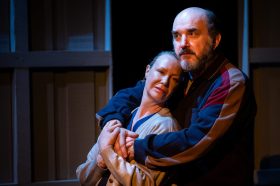The National Cultural Policy, Creative Australia, arrived last week like a birthday card from relatives you rarely see. The inscription on the inside from Uncle Simon elicited a collective ‘awww, that’s sweet’, but we’d been waiting 20 long years for that positive reinforcement, and we all know what’s really special about birthday cards from distant relatives.
With an attitude akin to Veruca Salt, we tore through Creative Australia in search of pocket money. The arts are a big family, but long-lost Grandma government has more than just Werther’s Originals in her pockets. She’s got $235 million to spend, and that’s more milk bottles and chocolate freckles than anyone could hope to eat themselves.
The Performing, Indigenous, Regional and Visual Arts all got their share, as did Music. Young people were given a leg up through the ArtsStart Program, Arts Ready Program and Creative Young Stars, while elite training institutions were also taken care of. So was the screen sector, and the newest and cutest member of the arts, gaming, was also lavished with cash. Everyone was pretty pleased.
But when the card arrived, it didn’t seem to be addressed to one of the oldest members of the arts – literature. Old literature is having a hard enough time as it is. The publishing industry, we’re repeatedly told, is in crisis, publishing advances are shrinking, print-runs are shorter, book stores are closing and competition from digital platforms is chewing into a starved industry.
We all know about the axing of the Queensland Premier’s Literary Awards last year, forcing the establishment of the community-driven Queensland Literary Awards, which relies on donors and sponsorship. The inaugural Stella Prize, set to be announced on 16 April, also relies on patrons and donors for funding. While there still exists prize and award funding from federal and state governments, many of the initiatives in the writing community rely upon a diverse array of funding.
On the NCP website, when you use the search function to find literature, writing, publishing, etc, it doesn’t turn up much. The Twitterverse chirped their disappointment at the absence of specific platforms for literature in Creative Australia, but it’s not that surprising.
Like the above examples, many writing initiatives, be it residencies, workshops, festivals or organisations, rely on a variety of funding initiatives, from private donors to corporate sponsorship and partnership, membership, ticket sales, and even crowd-funding.
Unfortunately, unlike specific performing arts companies, nine of which spliced up $9.3 million, state writers’ centres didn’t get a specific allocated amount, which was one particular gripe last week.
But authors and associated writing organisations looking for more than lint in the government’s pockets should’ve paid close attention to the big winner of the announcement – the Australia Council.
Taking the lion share of the love (and thus the money), the Australia Council pocketed a cool $75.3 million. Out of that money, $60 million has been allocated to grants over the next four years. While the Australia Council’s grants support all the arts, there’s still a decent amount that goes specifically to the written word.
Many, if not all of the state writers’ organisations are funded partly through Australia Council grants. The shortfall is made up through membership and donations, as well at times through funding from state arts ministries. This is the same for many performing and visual arts organisations.
The search function for Literature is far better on the Australia Council website than it is the National Cultural Policy site. You hit Literature in their grant section and you’ll get 23 different grants, applicable to individual writers in all stages of their career. They’ve usually got numerous rounds, meaning there is more opportunity. If you’re worried about organisations, they have their own avenues to apply for funding that come under a number of different categories. Then of course, there are the various state levels of funding as well.
The Australian Society of Author’s Angelo Loukakis seems to realise that a trickle-down effect might be the best way for writers to access the Creative Australia money, today stating, ‘If some meaningful proportion of that $75 million finishes up in authors’ pockets, that’s a welcome thing.’
It’s also good to remember that the Chair of the Australia Council Literature Board Sophie Cunningham is herself a writer, editor and publisher. With 25 years in the industry, two fiction and one non-fiction book under her belt, the interests of writers are in good hands with Cunningham.
Of course, not everyone can get funding and that’s not ideal. It would be lovely to give everyone everywhere everything they need, but unfortunately Grandma government isn’t a fairy grandmother.
What should really be taken from Creative Australia is that what’s written on the card is often more valuable than the money inside. Though he’s no longer with us, Crean’s inscription wasn’t an empty annotation. He put the arts on the national agenda, highlighting the economic, cultural and social benefits.
With that in mind and the importance of all the arts underscored, one can only hope that Creative Australia will inspire a magnification of funding, not just through the federal and state governments, but from the corporate and private sectors as well. Most of all, hopefully it will inspire individuals to reach into their pockets in support of their local arts organisations.
Writing might have been left off the card, but everyone in the arts lives under the same ramshackle roof. The more the arts and creative practices are exalted, the more opportunity there is for everyone – writers especially – they’re needed across all the arts.
So take solace scribes, even that brat gaming needs you.





